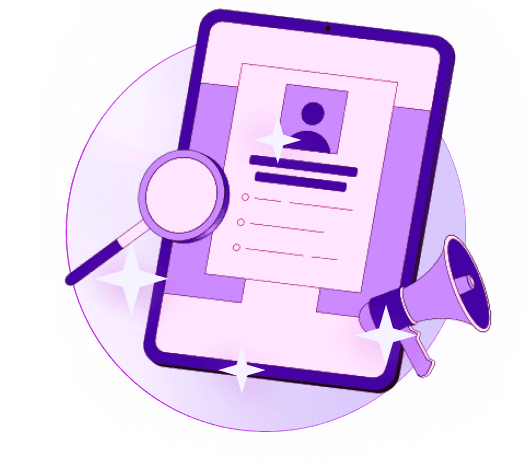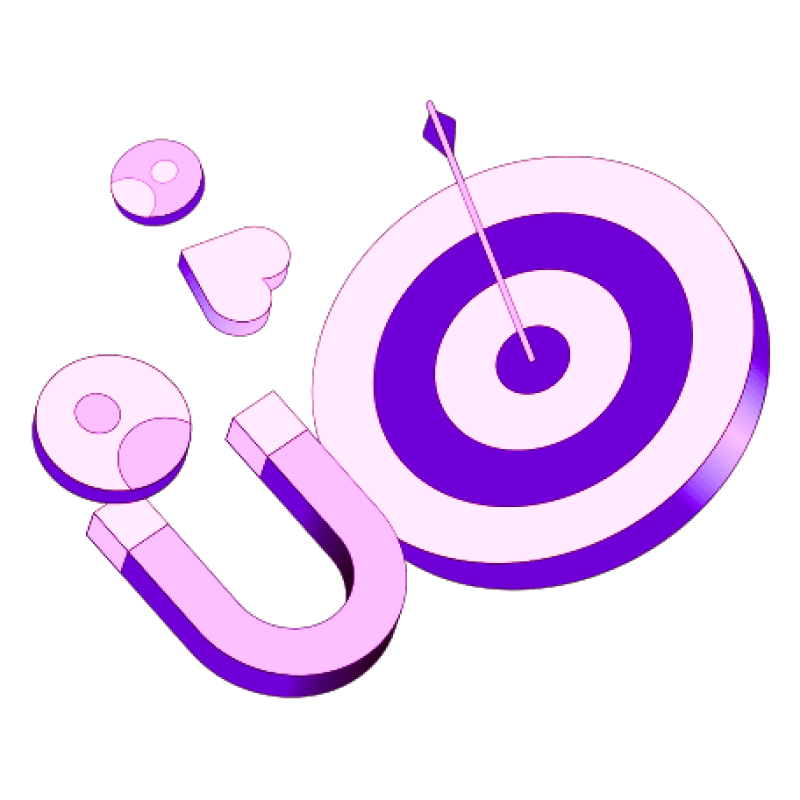Blogs
Articles

8 Best Lead Scoring Software Tools That Actually Work (2025 Guide)
Lead scoring software has become crucial in today's sales world. B2B companies now use it 14 times more than they did in 2011. Finding a solution that actually works is the real challenge.
Predictive lead scoring market's value will jump from $1.4 billion in 2020 to $5.6 billion by 2025. This makes it the perfect time to upgrade your lead generation automation strategy. This piece will show you 8 lead scoring software tools that deliver real results in 2025.
You'll learn how to focus on leads that truly matter and cut through all the noise.
Persana AI

Persana AI has emerged as a standout tool in the B2B prospecting space that helps sales teams scale their outreach efforts. This AI-powered lead scoring software blends advanced technology with practical features that identify and help teams participate with high-value prospects without traditional manual work.
Persana AI Key Features
The heart of Persana's lead scoring lies in its proprietary AI engine. The system learns from past email campaigns, CRM data, and public information to create custom models for each sales team. This signal-based approach brings together touchpoints throughout the buyer's trip and uses internal data with public web sources to spot opportunities most likely to convert.
Persana stands out from other lead scoring tools because of its detailed enrichment capabilities. The platform links to over 75 data sources to add significant information to your leads. You'll get:
Job titles and company details
Contact information (emails and phone numbers)
Company news and job openings
Technologies used
The AI handles research automatically instead of making you spend hours on prospect research. Persana maintains "the world's largest database from 100+ top sources" that lets you build targeted prospect lists using specific criteria like company size, founding year, location, and industry.
The platform excels at predictive lead scoring. Modern AI tools recognize patterns and predict which leads will convert, becoming smarter and more accurate as time passes. Sales teams that struggle with lead prioritization will find this automated system gives them a significant edge.
Persana's integration capabilities make it even more valuable. The system connects with popular email tools like Instantly, Lemlist, and Smartlead, plus multichannel outreach tools such as La Growth Machine. These connections automate your entire sales workflow seamlessly.
Persana AI Pros and Cons
Pros:
Your team saves 60% of campaign preparation time
Lead enrichment match rates exceed 75%, particularly for U.S.-based contacts
Reply rates double compared to manual methods (13.1% vs. 6.2% in actual campaigns)
No-code campaign builder works without developer help
One platform combines multiple tools (enrichment, sending, follow-up automation)
Digital agents work 24/7 without breaks
Real-time alerts notify you when prospects change jobs
Cons:
High-volume campaigns can get expensive with usage-based pricing
Non-U.S. based contacts show lower match rates
AI personalization features need time to master
AI-generated content quality requires regular monitoring
Persana AI Pricing
The platform uses tiered, usage-based pricing where credits determine your enrichment and message generation limits:
Free: $0/month with 50 credits (50 emails, 5 phones)
Starter: $68/month (billed annually) with 24,000 credits/year, perfect if you have small needs
Growth: $151/month (billed annually) with 60,000 credits/year, popular among small teams
Pro: $400/month (billed annually) with 216,000 credits/year, built for growth teams
Unlimited: $600/month (billed annually) with 600,000 credits/year, affordable for high-volume teams
Enterprise: Custom pricing meets large organizations' specific needs
The credit system allocates one credit per email enrichment, while finding phone numbers uses 10-20 credits based on your plan. The Starter plan supports about 2,000 leads monthly.
Persana AI offers a solid solution for sales teams that want to automate lead scoring and enrichment. The platform identifies promising leads and handles personalized outreach, making it valuable especially when you have B2B companies scaling their prospecting efforts.
Teams struggling with manual lead qualification should check out their free trial at Persana.
HubSpot Lead Scoring

HubSpot's lead scoring capabilities are the life-blood of marketing automation. The platform helps sales teams prioritize prospects who are most likely to convert. It offers both manual and AI-powered options that blend naturally with the broader HubSpot ecosystem.
HubSpot Lead Scoring Key Features
The platform matches different business needs with multiple scoring approaches. Users can choose from three distinct scoring methodologies: engagement scores that track prospect interactions, fit scores that assess demographic arrangement, and combined scores that integrate both metrics. This layered approach lets teams qualify leads with more precision.
HubSpot's predictive lead scoring utilizes machine learning to analyze thousands of data points across your contact base. The platform goes beyond manually selected criteria. It analyzes email interactions, website visits, form submissions, and other factors to calculate a "Likelihood to Close" score—showing conversion probability within 90 days.
Teams who want hands-on control can use HubSpot's manual scoring system through the "HubSpot Score" property. This lets you assign positive or negative point values based on specific fields and behaviors that matter to your business.
The platform now includes AI-assisted recommendations in its scoring capabilities. The system studies past interactions of converted leads and suggests improvements to your scoring model. Score decay features also reduce points automatically for inactive leads to keep your view current.
The score threshold system proves especially useful by grouping leads as high, medium, or low based on custom parameters. These groups can trigger automated workflows, notifications, and personalized content experiences.
HubSpot Lead Scoring Pros and Cons
Pros:
Simple setup process with a user-friendly interface
Knowing how to create multiple score models for different audiences or product lines
Complete data collection from first interaction to closed deal
Score history tracking shows lead trends over time
Natural integration with HubSpot's marketing automation tools
Score transparency through contact record visibility
Cons:
Custom reporting features are available only at Enterprise level
You can't compare different scoring models at once without third-party integration
Available data is limited to HubSpot ecosystem (can't directly use external data sources)
The new scoring tool takes longer to learn than the legacy system
Changes to scoring criteria affect all contacts and may disrupt existing workflows
HubSpot Lead Scoring Pricing
Subscription tiers determine HubSpot's lead scoring capabilities. Premium editions of all Hubs include standard contact scoring features. The most powerful features need specific subscriptions:
Manual lead scoring is available in both Professional and Enterprise tiers of Marketing Hub. This helps businesses start with basic scoring without the highest subscription level.
Marketing Hub Enterprise subscribers get exclusive access to predictive lead scoring and AI-assisted recommendations. This requires a bigger investment since Enterprise plans cost nowhere near Professional tiers.
Marketing Hub or Sales Hub provides company scoring capabilities. Sales Hub is needed to prioritize opportunities already in your pipeline with deal scoring.
MadKudu

MadKudu uses data science to qualify leads and helps B2B companies optimize their customer experience through AI-powered scoring. The platform combines behavior patterns and company data to help marketing teams find their best opportunities.
MadKudu Key Features
The platform's predictive lead scoring engine analyzes thousands of data points to find high-potential prospects. Traditional manual methods take time and lack consistency. MadKudu's AI adapts automatically based on your past data.
The platform identifies your ideal customer profile by looking at multiple aspects:
Behavioral analysis monitors prospect activities in various channels to spot buying signals
Firmographic analysis uses data from multiple vendors to find companies that match your business requirements
Signal-based prioritization uses fit and behavior predictions to grade leads and create the best buyer experience
MadKudu shines with its integration features. The system combines smoothly with popular CRM platforms like Salesforce and HubSpot. Lead scores update live without extra logins. This built-in integration triggers specific actions when scores change - sending hot leads to sales teams or customized emails to promising prospects.
MadKudu Pros and Cons
Pros:
Users report 3x higher conversion rates after implementation
Clear scoring logic helps teams understand lead scores, unlike "black box" competitors
Fits naturally with existing tech tools without workflow disruption
Support team gets praise for talent and thoughtfulness
Uses multiple scoring models for different markets, products, or regions
Live alerts help sales teams reach prospects at the right time
Cons:
Higher prices might not suit smaller companies
Takes time to master decision trees and advanced features
New users find model deployment challenging
Bug fixes sometimes take longer
Few options to customize the interface
Setup and configuration need considerable time
MadKudu Pricing
MadKudu offers premium pricing tiers that match its advanced features:
The Growth plan costs $999 monthly. It has configured lead scoring, buying predictions, standard lead enrichment, 3 MadKudu forms, all integrations, and support for 2 sales representatives.
The Pro tier costs $2,499 monthly. It supports 10 sales representatives and offers custom lead scoring, configured lead enrichment, 10 MadKudu forms, all integrations, and Slack support.
Large organizations typically spend $35,000 yearly on MadKudu. The cost ranges from $12,600 to $97,000 based on implementation size. Buyers often get discounts up to 31% through negotiations.
The Enterprise tier has custom pricing. It includes all Pro features plus website personalization, ad optimization, marketing qualified accounts (MQA), and dedicated success team support.
Infer

B2B companies that want data-driven lead prioritization can use Infer's sophisticated predictive analytics. Sales and marketing teams can identify high-value prospects with this machine learning-powered platform. It finds complex patterns in your customer data and creates precise lead scoring models that get better over time.
Infer Key Features
Infer uses advanced algorithms to review historical data and find patterns that suggest lead conversion potential. The platform combines internal CRM data with extensive external signals to create complete lead profiles. These profiles take into account:
Employee count and job openings
Web and social media presence
Technology vendors used
Patents and trademarks
Industry-specific indicators
The system offers both fit scoring and behavioral scoring capabilities. Fit scoring reviews leads based on how well they match your ideal customer profile. Behavioral scoring tracks engagement levels and activities across channels. So this all-encompassing approach gives a fuller view of prospect quality.
Infer Pros and Cons
Pros:
Works with many marketing and data management platforms
Well-laid-out configuration with user-friendly interface
Complete analytics and reporting capabilities
Highly accurate predictive modeling that improves over time
Reduces sales cycles - one customer saved a week per deal, saving over $100,000 yearly
Sales and marketing teams work better together by focusing on likely-to-convert leads
Cons:
Customer support response times can lag
Small and medium-sized businesses get limited support
New users face a steep learning curve
Higher prices make it less suitable for smaller companies
Best results come from tech companies selling to other software companies
Infer Pricing
Infer targets enterprise-level customers with pricing that matches its advanced capabilities. You'll need to request a quote since the company doesn't show standard pricing on its website.
Industry reports show monthly pricing starts around $1,000. This makes it one of the more expensive lead scoring software options. The platform doesn't offer free trials or freemium versions. This suggests its focus on committed enterprise customers rather than companies just exploring lead scoring.
LeadSquared

LeadSquared offers a complete approach to lead management through its triple-metric qualification system. The lead scoring software combines quality scores, lead scores, and engagement scores to give sales teams a multi-dimensional view of their prospects' potential.
LeadSquared Key Features
LeadSquared's strength comes from its three distinct lead qualification metrics. The lead score monitors overall engagement throughout a lead's history. The engagement score looks at recent interactions within a customizable timeframe. The quality score shows how well prospects match your ideal customer profile. These three scoring approaches help prioritize leads with precision.
Activity tracking serves as LeadSquared's scoring foundation. The platform adds points automatically to both online and offline activities. These activities include email opens, link clicks, webpage visits, and landing page submissions. Users can set up custom activities specific to their industry. Examples include "attending a seminar" for education or "updating KYC documents" for finance.
LeadSquared's automation goes beyond simple scoring. The system changes lead stages automatically based on score thresholds. Sales representatives receive notifications when leads become sales-ready. These automated workflows help sales teams pursue high-potential leads faster and ensure consistent follow-up processes.
LeadSquared Pros and Cons
Pros:
Responsive customer support teams
Easy-to-use interface with customization options
Simple lead management connecting multiple platforms
Complete CRM capabilities for information storage and distribution
Economical solutions compared to market competitors
Cons:
Limited integration with third-party tools
Restricted reporting functionality with separate reports
Email suite and marketing features have limited applications
Data import and setup take considerable time
Customer support becomes unresponsive occasionally
LeadSquared Pricing
LeadSquared's pricing tiers suit different business needs. The simple marketing automation package starts at approximately $400 per month. This package has email reports, campaign monitoring, and lead attribution.
The Standard tier costs around $120 per month. It adds vital features like lead scoring, engagement scoring, and lead distribution. The Enterprise level costs approximately $250 per month. It has advanced features like A/B testing, custom reports, and a dedicated account manager.
LeadSquared also offers role-based pricing options. The Sales Pro plan costs $25 per user monthly. The Sales Super tier runs at $50 per user monthly. Marketing teams can choose the Marketing Pro package at $106 per account or Marketing Super at $177 per account.
Storage allowances and email limits vary by plan. Lower-tier plans typically offer 2GB plus 20MB per user storage and 50,000 emails. Premium plans provide 10GB plus 20MB per user with 100,000 emails.
6sense

6sense transforms lead scoring by focusing on buying intent signals that other platforms overlook. This AI-powered system monitors anonymous research activities across the web. Sales teams can identify potential buyers before they submit a contact form.
6sense Key Features
6sense's predictive intelligence technology stands out from the rest. The platform analyzes billions of digital signals such as page visits, keyword searches, and content consumption across third-party sites. These insights match specific accounts and personas, even without prospects directly identifying themselves.
The platform excels by detecting buying intent early in the sales cycle. 6sense identifies online research that usually stays anonymous—like product comparisons on review sites such as G2 or TrustRadius. Sales teams gain a valuable head start with this visibility.
The platform goes beyond simple scoring and provides complete account intelligence through:
Predictive AI models that forecast which accounts will likely purchase
Daily lists of high-intent, in-market accounts
Contact recommendations that highlight active decision-makers
Simplified outreach processes through automated prospecting
The platform keeps contact databases clean by updating information regularly. This data stays actionable. 6sense combines this intelligence with popular CRM systems to show insights within existing workflows.
6sense Pros and Cons
Pros:
Outstanding AI-driven insights through predictive analytics and buyer intent data
Complete account-based marketing tools to target high-value accounts
Users can identify anonymous website visitors and their buying intent
Custom integrations with CRM and marketing tools
Multi-channel orchestration ensures consistent messaging
Cons:
Premium pricing compared to market alternatives
User interface can be complex with data refresh delays
Users need extensive training to master the platform
Large sales teams require multiple Salesforce licenses
Data updates can be slow according to user feedback
6sense Pricing
6sense offers pricing tiers based on business size and needs. While exact prices aren't public, industry reports show annual investments range from $60,000 to $300,000.
The pricing structure has:
Free Plan: $0/month with 50 credits (simple buyer discovery)
Team Plan: Custom pricing (includes technographics and CRM integration)
Growth Plan: Custom pricing (adds 6sense Intent and advanced analytics)
Enterprise Plan: Custom pricing (complete AI features and predictive analytics)
The pricing reflects 6sense's status as a premium enterprise solution for serious account-based marketing programs.
ActiveCampaign

ActiveCampaign stands out among marketing automation platforms with its powerful lead scoring capabilities. Businesses can identify and qualify promising leads effectively. The platform serves customers in 170 countries and provides targeted lead prioritization features.
ActiveCampaign Key Features
The lead scoring system gives numerical values to contacts based on their actions and engagement. Your contacts receive automatic score updates when they open emails, click links, visit websites, or submit forms. The system works exceptionally well because it lets you run multiple lead scoring programs at once. You can track email interaction and site tracking separately.
The platform excels at using scores in automation workflows. ActiveCampaign triggers email notifications, assigns tasks to sales representatives, or starts customized automation sequences when contacts hit specific score thresholds. Your most engaged prospects can get targeted information and compelling offers.
The platform supports both contact-level and deal-level scoring. Companies can track individual prospect interest and evaluate overall deal quality. The accuracy remains intact even when primary contacts change.
ActiveCampaign Pros and Cons
Pros:
Easy-to-use drag-and-drop interface works for users of all skill levels
Powerful automation capabilities streamline marketing processes
High email deliverability rates maximize inbox placement
Large template library helps create campaigns quickly
Detailed testing tools include A/B testing
Cons:
Small businesses might find the pricing structure difficult
Basic CRM functionality compared to dedicated systems
Highly customized visual designs have limited flexibility
Customer support responsiveness varies
No free plan exists to try the platform
ActiveCampaign Pricing
ActiveCampaign has four main pricing tiers. The Lite plan costs $29 monthly with essential marketing automation features. The Plus plan costs $49 monthly and adds vital lead scoring capabilities with CRM and sales automation. The Professional plan starts at $149 monthly and includes advanced features like predictive sending and split automation. The Enterprise plan begins at $259 monthly with custom reporting and dedicated account representatives.
Contact list size affects pricing for all tiers. Annual commitments and non-profit organizations can get special discounts.
Salesmate

Salesmate combines a resilient CRM functionality with strong lead scoring capabilities. The platform serves over 8,500 businesses worldwide and maintains impressive ratings between 4.6 and 4.7 on major review platforms. This unified customer platform gives sales teams the ability to focus on high-potential leads through efficient workflows.
Salesmate Key Features
The life-blood of Salesmate's lead scoring system lies in its "Salesmate Score" feature through the Automation Journeys add-on. The system has over 60 triggers, conditions, and actions that automatically update lead scores based on prospect engagement. We established scoring rules that adjust when contacts take specific actions. This helps teams focus on promising opportunities.
Salesmate Score stands out with its flexibility. Users can configure it for both rule-based and traditional scoring methods. The platform allows for:
Automated score adjustments based on lead actions and engagement
Deprecating scores when conversation timeframes matter
Visible scoring directly on contact profile pictures for quick identification
The system merges with over 700 business applications, including popular marketing tools like MailChimp and ActiveCampaign. E-commerce businesses benefit from connections with Shopify and BigCommerce. These platforms pull customer and order data directly into the CRM and create a detailed view of each lead's buying habits.
Salesmate Pros and Cons
Pros:
Customizable pipelines suited to your unique sales process
Email tracking provides immediate insights into prospect interactions
Natural integration with third-party tools and applications
User-friendly design reduces onboarding time and costs
Unified platform for lead generation, qualification, and communication
Cons:
Limited marketing automation features compared to dedicated platforms
Steeper learning curve for sales teams using iOS
Mobile app functionality less powerful than desktop version
Email template library is relatively scarce
Support limited to email on most plans
Salesmate Pricing
Salesmate provides tiered pricing with annual discounts available:
Basic: USD 23.00/user/month (annual) or USD 29.00/user/month (monthly) - has contact management and simple features
Pro: USD 39.00/user/month (annual) or USD 49.00/user/month (monthly) - adds sales automation and custom dashboards[332]
Business: USD 63.00/user/month (annual) or USD 79.00/user/month (monthly) - has lead scoring and power dialer[332]
Enterprise: Custom pricing with dedicated account manager and additional support
A 15-day free trial helps users assess the platform before committing.
Conclusion
The right lead scoring software can make all the difference between wasting time on cold prospects and closing deals with qualified buyers. This piece looks at eight powerful tools that help sales teams work better by finding promising leads through informed decisions. These platforms come with their own strengths. Persana AI pulls data from 75+ sources. HubSpot naturally fits with marketing automation. MadKudu shows clear scoring logic. Infer spots complex patterns.
Good lead scoring tools cut down the time spent on qualifying leads that once took hours to do by hand. Sales teams can then put their energy into prospects who are more likely to buy. This leads to faster sales and better conversion rates. On top of that, these tools get smarter over time through machine learning as they see more of your successful deals.
Your business needs should point you to the right choice. Smaller teams might like simple tools like ActiveCampaign or Salesmate. Larger companies often need all the features that come with 6sense or MadKudu. Money matters too - some tools cost less than $30 a month while others can run up to $60,000 a year.
Teams looking to boost their prospecting with AI-powered lead scoring can start with Persana. Their free tier lets you try key features before you spend any money.

Create Your Free Persana Account Today
Join 5000+ GTM leaders who are using Persana for their outbound needs.
How Persana increases your sales results
One of the most effective ways to ensure sales cycle consistency is by using AI-driven automation. A solution like Persana, and its AI SDR - Nia, helps you streamline significant parts of your sales process, including prospecting, outreach personalization, and follow-up.



